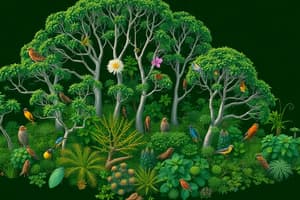Podcast
Questions and Answers
A researcher is studying a forest and observes a high count of oak trees in one section, a variety of bird species throughout, and a concentration of wildflowers near the river. Which component of community structure relates to the count of oak trees?
A researcher is studying a forest and observes a high count of oak trees in one section, a variety of bird species throughout, and a concentration of wildflowers near the river. Which component of community structure relates to the count of oak trees?
- Distribution
- Abundance (correct)
- Species Richness
- Species Diversity
In a study of a local park, researchers note that squirrels are found throughout the entire park, while a specific species of butterfly is only found near the butterfly garden. Which component of community structure are the researchers observing regarding the squirrels and butterflies?
In a study of a local park, researchers note that squirrels are found throughout the entire park, while a specific species of butterfly is only found near the butterfly garden. Which component of community structure are the researchers observing regarding the squirrels and butterflies?
- Abundance
- Species Diversity
- Distribution (correct)
- Population Density
An ecologist is comparing two different fields. Field A has 15 different species of plants, while Field B has only 7. Which component of community structure is the ecologist directly comparing?
An ecologist is comparing two different fields. Field A has 15 different species of plants, while Field B has only 7. Which component of community structure is the ecologist directly comparing?
- Species Diversity (correct)
- Abundance
- Distribution
- Population Density
A conservation group is monitoring the recovery of a forest after a fire. Initially, only a few hardy plant species are present, but over time, new species begin to colonize the area, and the population sizes of existing species change. Which aspect of the community structure is changing as the forest recovers?
A conservation group is monitoring the recovery of a forest after a fire. Initially, only a few hardy plant species are present, but over time, new species begin to colonize the area, and the population sizes of existing species change. Which aspect of the community structure is changing as the forest recovers?
A marine biologist is surveying a coral reef. They observe a large population of clownfish, identify numerous different coral species, and map the locations of each species of coral. Which of the following combines abundance, species diversity, and distribution?
A marine biologist is surveying a coral reef. They observe a large population of clownfish, identify numerous different coral species, and map the locations of each species of coral. Which of the following combines abundance, species diversity, and distribution?
Which statistical measure describes the spread of data points around the mean, indicating the variability in a dataset?
Which statistical measure describes the spread of data points around the mean, indicating the variability in a dataset?
In ecological studies, which of the following best illustrates the concept of 'range' when describing temperature variation?
In ecological studies, which of the following best illustrates the concept of 'range' when describing temperature variation?
If a scientist is studying the temperature variations in a habitat and records a minimum temperature of 5°C and a maximum temperature of 30°C, what is the range of temperature variation?
If a scientist is studying the temperature variations in a habitat and records a minimum temperature of 5°C and a maximum temperature of 30°C, what is the range of temperature variation?
Which of the following statements accurately describes the relationship between environmental factors and their variability?
Which of the following statements accurately describes the relationship between environmental factors and their variability?
In the context of ecological studies, why is understanding the range and standard deviation of environmental factors important?
In the context of ecological studies, why is understanding the range and standard deviation of environmental factors important?
A scientist is studying the growth rate of a plant species in a particular region. To understand the variability in growth, they want to calculate a statistical measure that reflects the spread of growth rates around the average. Which statistical measure would be most appropriate for this purpose?
A scientist is studying the growth rate of a plant species in a particular region. To understand the variability in growth, they want to calculate a statistical measure that reflects the spread of growth rates around the average. Which statistical measure would be most appropriate for this purpose?
A researcher is investigating factors influencing the population size of butterflies in a meadow. They observe fluctuations in butterfly numbers over the year. Which factor should they start investigating related to the seasonal changes?
A researcher is investigating factors influencing the population size of butterflies in a meadow. They observe fluctuations in butterfly numbers over the year. Which factor should they start investigating related to the seasonal changes?
Ecologists are comparing the wing length of birds from two different islands. They calculate the average wing length for each island. Which additional statistical measure would best help them determine if the wing lengths are significantly different?
Ecologists are comparing the wing length of birds from two different islands. They calculate the average wing length for each island. Which additional statistical measure would best help them determine if the wing lengths are significantly different?
A marine biologist observes that coral reef ecosystems in different locations exhibit variations in biodiversity. Some reefs have a high number of different species. If they are trying to understand the VARIATION, what factor should be considered?
A marine biologist observes that coral reef ecosystems in different locations exhibit variations in biodiversity. Some reefs have a high number of different species. If they are trying to understand the VARIATION, what factor should be considered?
A researcher is studying the effect of temperature on the metabolic rate of lizards. They collect temperature data both inside and outside a lizard enclosure using sensors every hour for a week. What could they calculate using this data?
A researcher is studying the effect of temperature on the metabolic rate of lizards. They collect temperature data both inside and outside a lizard enclosure using sensors every hour for a week. What could they calculate using this data?
Which of the following statements best describes the role of standard deviation in analyzing a graph with only one average?
Which of the following statements best describes the role of standard deviation in analyzing a graph with only one average?
In the context of analyzing graphs, what does a significant difference in standard deviation between two datasets with similar averages suggest?
In the context of analyzing graphs, what does a significant difference in standard deviation between two datasets with similar averages suggest?
Based on the provided information about clam capture locations (Lewes and Wilmington, DE), what additional data would be most useful to determine if there are significant spatial variations in clam populations?
Based on the provided information about clam capture locations (Lewes and Wilmington, DE), what additional data would be most useful to determine if there are significant spatial variations in clam populations?
Given a graph showing the average number of clams captured ($\pm$ 1 standard deviation) in Lewes and Wilmington, DE, what conclusion can be drawn about clam populations if the standard deviation for Lewes is much larger than for Wilmington, but their averages are similar?
Given a graph showing the average number of clams captured ($\pm$ 1 standard deviation) in Lewes and Wilmington, DE, what conclusion can be drawn about clam populations if the standard deviation for Lewes is much larger than for Wilmington, but their averages are similar?
Suppose a researcher wants to conduct a follow-up study to build on the initial clam capture data for Lewes and Wilmington, DE. Which approach would be best to determine when you are most likely to catch the most clams?
Suppose a researcher wants to conduct a follow-up study to build on the initial clam capture data for Lewes and Wilmington, DE. Which approach would be best to determine when you are most likely to catch the most clams?
Flashcards
Abundance
Abundance
The number of individuals of the same species in a specific area at a specific time.
Species Diversity
Species Diversity
The number of different species present in a community and their distribution.
Distribution
Distribution
The spatial arrangement of individuals of various species in an area.
Components of Community Structure
Components of Community Structure
Signup and view all the flashcards
Population
Population
Signup and view all the flashcards
Standard Deviation
Standard Deviation
Signup and view all the flashcards
Temporal Variation
Temporal Variation
Signup and view all the flashcards
Spatial Variation
Spatial Variation
Signup and view all the flashcards
Average Clams Captured
Average Clams Captured
Signup and view all the flashcards
Graph Interpretation
Graph Interpretation
Signup and view all the flashcards
Variation
Variation
Signup and view all the flashcards
Quantity in Variation
Quantity in Variation
Signup and view all the flashcards
Range
Range
Signup and view all the flashcards
Non-Constant Variations
Non-Constant Variations
Signup and view all the flashcards
Quantitative Variation
Quantitative Variation
Signup and view all the flashcards
Qualitative Variation
Qualitative Variation
Signup and view all the flashcards
Temporal Factors
Temporal Factors
Signup and view all the flashcards
Study Notes
Community Structure
- Components of community structure
- Abundance: the number of individuals of the same species in a given area at a given time.
- Species Diversity: the number of different kinds of organisms (species) present; also considering which species are in space and time.
- Distribution: where individuals are in space.
Studying That Suits You
Use AI to generate personalized quizzes and flashcards to suit your learning preferences.





